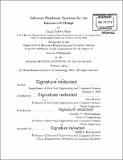Software-hardware systems for the Internet-of-Things
Author(s)
Salehi-Abari, Omid
DownloadFull printable version (27.65Mb)
Other Contributors
Massachusetts Institute of Technology. Department of Electrical Engineering and Computer Science.
Advisor
Dina Katabi and Anantha P. Chandrakasan.
Terms of use
Metadata
Show full item recordAbstract
Although interest in connected devices has surged in recent years, barriers still remain in realizing the dream of the Internet of Things (IoT). The main challenge in delivering IoT systems stems from a huge diversity in their demands and constraints. Some applications work with small sensors and operate using minimal energy and bandwidth. Others use high-data-rate multimedia and virtual reality systems, which require multiple-gigabits-per-second throughput and substantial computing power. While both extremes stress the computation, communications, and energy resources available to the underlying devices, each intrinsically requires different solutions to satisfy its needs. This thesis addresses both bandwidth and energy constraints by developing custom software-hardware systems. To tackle the bandwidth constraint, this thesis introduces three systems. First, it presents AirShare, a synchronized abstraction to the physical layer, which enables the direct implementation of diverse kinds of distributed protocols for loT sensors. This capability results in a much higher throughput in today's IoT networks. Then, it presents Agile-Link and MoVR, new millimeter wave devices and protocols which address two main problems that prevent the adoption of millimeter wave frequencies in today's networks: signal blockage and beam alignment. Lastly, this thesis shows how these systems enable new IoT applications, such as untethered high-quality virtual reality. To tackle the energy constraint, this thesis introduces a VLSI chip, which is capable of performing a million-point Fourier transform in real-time, while consuming 40 times less power than prior fast Fourier transforms. Then, it presents Caraoke, a small, low-cost and low-power sensor, which harvests its energy from solar and enables new smart city applications, such as traffic management and smart parking.
Description
Thesis: Ph. D., Massachusetts Institute of Technology, Department of Electrical Engineering and Computer Science, 2018. Cataloged from PDF version of thesis. Includes bibliographical references (pages [187]-201).
Date issued
2018Department
Massachusetts Institute of Technology. Department of Electrical Engineering and Computer SciencePublisher
Massachusetts Institute of Technology
Keywords
Electrical Engineering and Computer Science.